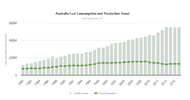Filling up your car for $6 is an incentiveThe pace of technology should never be underestimated. The iPod was released in 2001; I'm sure in 2006 there were statistics showing its sales weren't all that hot, that CDs were still showing robust sales. Then the iPhone came out in 2007 and he we are 15 years later and CDs are dead. Think of all the things the internet has killed off in 25 years, streaming etc. Obviously cars are a much larger investment, but all it will take is a single development, an influx of second-hand cars from government fleets and the changeover could gather momentum rapidly. I wouldn't be surprised if ICE are the preserve of enthusiasts in 20 years.
Servicing your car for chump change in an incentive.
Once they get the range up and make batteries more modular so you can swap them as they get old etc











